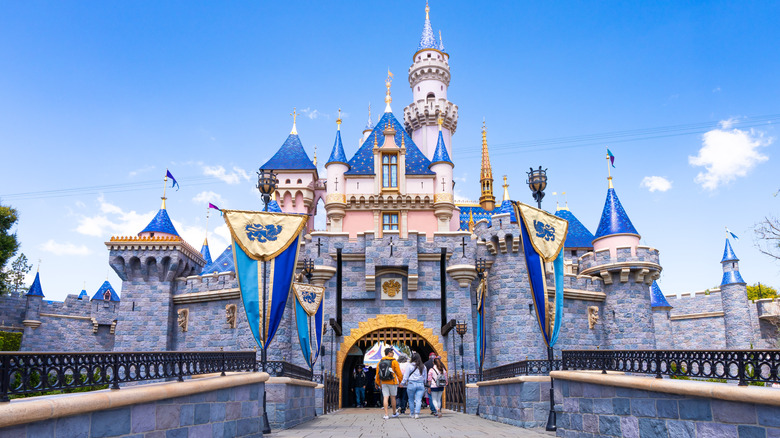One of the great things about taking repeat visits to Disney Parks through the years is the chance to experience all the fantastic innovations the Imagineers can dream up. While lesser theme parks might start to feel a bit stale after a few visits, Disney Parks love to keep things fresh, whether it’s updating the great food options available at the Magic Kingdom or coming up with new attractions even non-Disney adults can get into. But all that innovating can seem like a drag when you travel hundreds or even thousands of miles only to find your favorite ride of all time has been unceremoniously canceled.
The good news is that Disney folks tend to put a good deal of thought into these changes. For the most part, when a beloved attraction goes out, another, often even better one, isn’t far behind. Still, there’s something to be said for the closure that comes from knowing why we had to say goodbye to a favorite theme park ride. Grab your mouse ears and step carefully into the PeopleMover as we take a look at why your favorite Disney rides are no longer around.
Body Wars closed when the Wonders of Life Pavilion did
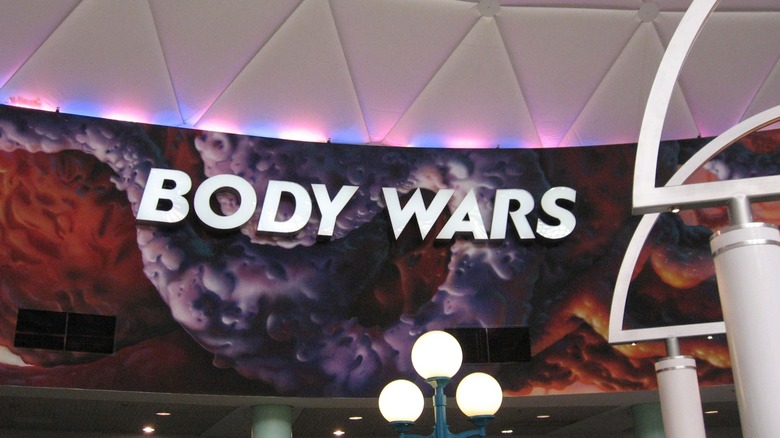
Remember the 1987 movie “Innerspace” where Martin Short was injected with a very tiny Dennis Quaid? That was pretty much the same concept behind Body Wars, the Epcot motion simulator ride that shrunk parkgoers to microscopic size to study the human body’s white blood cells. Built using the same technology as the popular Star Tours attraction, the ride shuffled a group of up to 40 riders into one of four simulators. After a brief introduction to the research project from Miniaturized Exploration Technologies, the simulation would begin.
Much like the Star Tours ride, the ride’s movements were synchronized to a POV film, causing it to feel a lot like getting rushed around a human bloodstream. Located at the Wonders of Life pavilion, the educational ride ran for a little under two decades before closing with the pavilion in 2007 after a few years of suffering from dwindling ride lines.
[Featured image by Edward Russell via Wikimedia Commons | Cropped and scaled | Creative Commons Attribution 2.0 Generic]
Anna and Elsa took over Maelstrom at Epcot
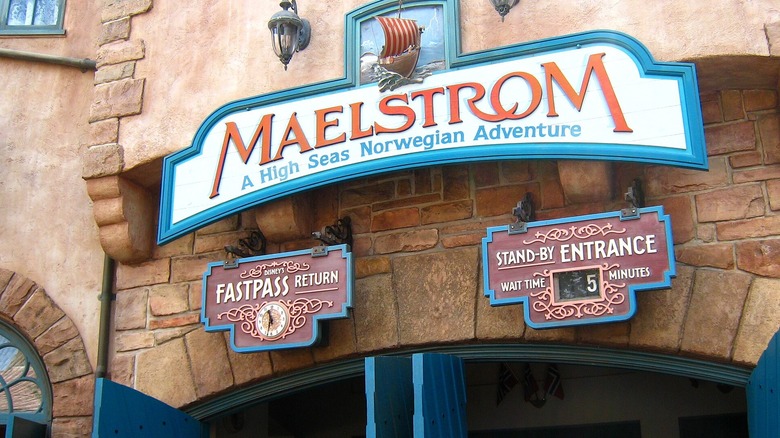
Walt Disney World’s Norway pavilion might seem like an unlikely place to find a spooky ride, but for many years, park guests found this haunting look at Norway through the eyes of an ancient god to be one of the park’s spookier hidden gems. Part dark ride, part log chute, the ride whisked guests away from a Norwegian village and into its mythology-woven history, past images of audio-animatronic Vikings, trolls, polar bears, and penguins.
After the ride’s opening in 1988, it managed to run for nearly three decades untouched by character commercialism until its closure in 2014 to make room for Frozen Ever After. According to park insiders, the goal for the Arendelle makeover was to preserve the ride’s tribute to Scandinavian culture while helping to bring more guests to Epcot’s World Showcase.
[Featured image by Kjersti Holmang via Wikimedia Commons | Cropped and scaled | CC BY-SA 3.0]
The Skyway got too spendy to renovate
Visiting any Disney park is an exercise in sensory overload. But for many years, guests could take a step back and get a bird’s eye view by hopping into the gondolas of the Skyway, a park staple at Disneyland, Walt Disney World, and Tokyo Disneyland. The original Disneyland Skyway opened in 1956, dreamily shuffling park guests back and forth from Tomorrowland to Fantasyland on a ski lift-style gondola until it shut down in 1994. The other two Skyways would be closed by the end of the millennium.
According to Allears.net, the rides’ closures had been associated by rumor with a couple of Skyway-related falls. But the reality was that several decades of waning lines made the ever-mounting cost of repairing these rides inevitable. Fortunately for fans of the gondola ride, the enclosed Disney Skyliner was installed in 2019 as part of the official Disney transport system.
The Motor Boat Cruise became a chill-out zone
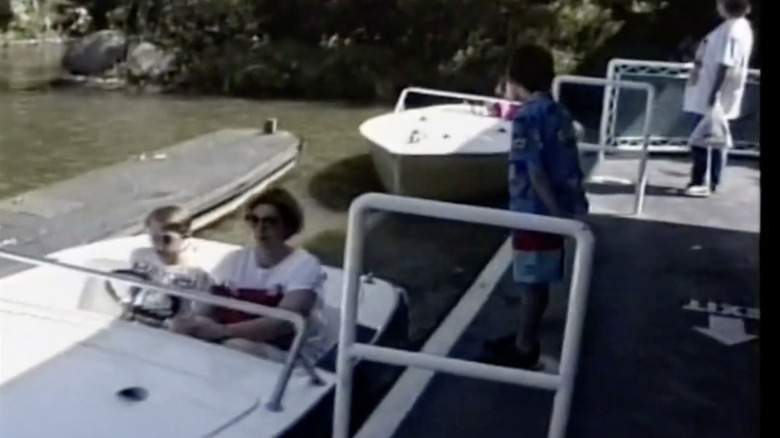
Admission and 15 Adventures/YouTube
Depending on what year you visited, there’s a fair chance you got a chance to experience one incarnation of this leisurely boat ride if you visited Disneyland sometime before 1993. Originally opening in 1957, the Motor Boat Cruise was a slowgoing boat ride on tracks that cruised around the edge of Tomorrowland and Fantasyland. You couldn’t actually do much with its steering wheel, but it was still fun to let the kids get a turn at it. Disney is all about imagination, after all.
With the addition of some fairly low-rent plywood characters from the 1980s Disney cartoon “The Adventures of the Gummi Bears,” the ride temporarily became the Motor Boat Cruise to Gummi Glen before officially getting shuttered in 1993 to make room for Mickey’s Toontown. These days, the space where the entrance once was has been reconfigured as one of the park’s many rest areas.
If You Had Wings evolved into a Buzz Lightyear attraction
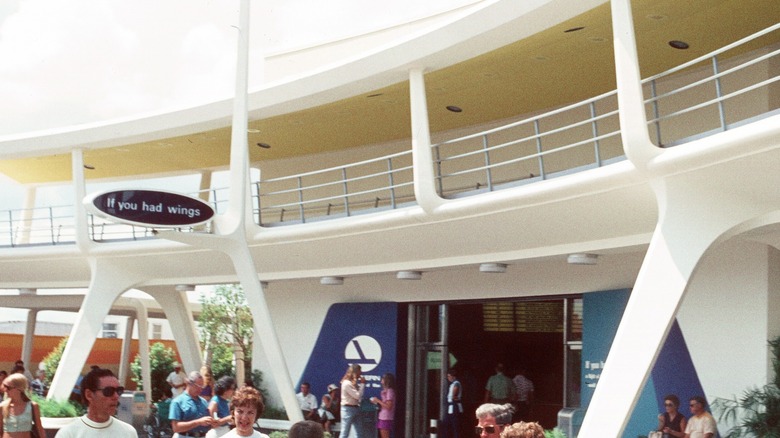
First rolled out in 1972, If You Had Wings was one of those rides that you didn’t necessarily break a sweat getting into line for, but if you happened to be nearby, it was a relaxing enough way to kill a few minutes before fighting the crowds of nearby Fantasyland. The ride featured Disney’s patented Omnimover technology, which moved guests through the ride while surrounded by film, giving guests the sense that they’re part of what it’s showing.
At the time, it was a pretty novel innovation. According to the Tomorrow Society, the ride, which gave the experience of traveling by air through Eastern Air Lines destinations, even had its own small cult following. Through the years, the ride underwent several changes as its sponsorship shifted, becoming Delta Dreamflight and then just Take Flight before getting 86ed in 1998 to make room for Buzz Lightyear’s Space Ranger Spin.
[Featured image by Dada1960 via Wikimedia Commons | Cropped and scaled | CC BY-SA 4.0 International]
Horizons got replaced by something much cooler
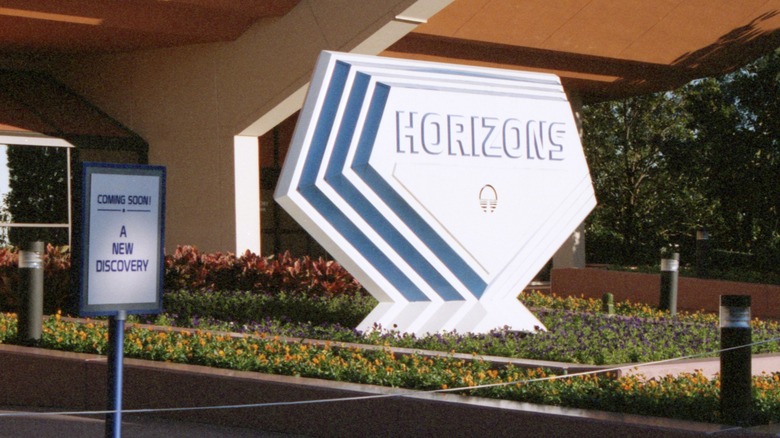
With its dreamy 1980s easy-listening intro and a dark ride format that felt a bit like Spaceship Earth lite, Horizons wasn’t the flashiest ride in Epcot. But there was something to be said for its inspirational, innovation-focused content — and the nearly 15-minute ride time meant guests would have plenty of time to rest their feet in the process. Similar to Tomorrowland’s Carousel of Progress, Horizons took guests on a journey through human progress, but with a twist — in this case, imagining what the future might hold for humanity, from education and household innovations to agriculture and medicine.
Sadly, the ride disappeared seemingly without reason around the turn of the millennium, although speculation on Disney discussion boards suggests repair costs may have been a factor. These days, Mission: SPACE stands where the forward-looking ride once was.
[Featured image by Stephen Miller via Wikimedia Commons | Cropped and scaled | CC BY 2.0]
Adventure Through Inner Space was replaced by Star Tours
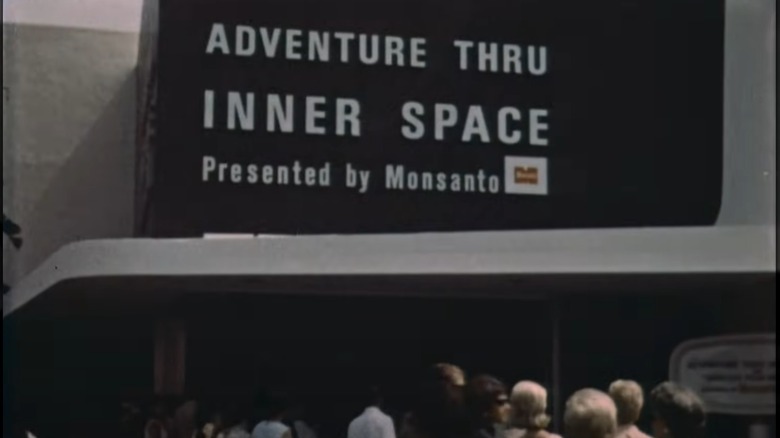
Disney History Institute/YouTube
Although Adventures Through Inner Space was beloved in its time, it might be for the best that it has passed into Disney history — a ride devoted to Monsanto’s ability to rearrange molecules might not go over as well in the modern zeitgeist. But for audiences in the mid-1960s, a chance to shrink to atomic size and experience the world in miniature had to be cool — albeit a little trippy or even terrifying, depending on who you’re asking.
Inspired by the 1957 “Disneyland” TV show episode “Our Friend the Atom,” the ride loaded guests into “Atommobiles,” which would then be shrunk by the Monsanto Mighty Microscope. Despite Monsanto’s sponsorship ending in the late 1970s, the attraction stuck around through the mid-80s, when it was eventually replaced by Star Tours. To keep the magic alive, a fan named Steve Wesson recreated the ride experience for YouTube using the original audio.
The Flying Saucers were too costly for a one-seater
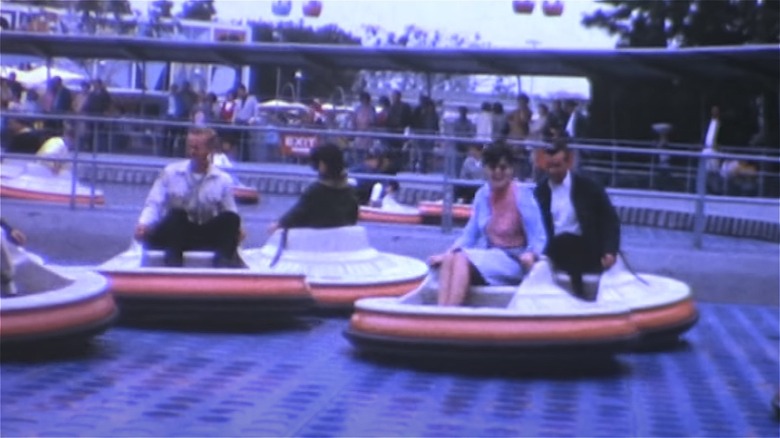
Disney History Institute/YouTube
For anyone who has ever wondered what it might be like to sit on the air hockey puck (we assume that includes everyone), Disney’s Flying Saucers might have been a dream come true. Sadly, these splendid saucers were only around for about five years, largely due to a fairly significant engineering issue that simply couldn’t be overcome.
Located near the site of today’s Space Mountain, the bumper car-style ride worked by placing guests on “flying saucer” vehicles that sat on a cushion of air thanks to some clever directed low-pressure air underneath them. Without a steering wheel, guests simply shifted their weight to get their saucers moving in any direction they chose. While many guests enjoyed the ride, its low capacity wouldn’t make it viable in the modern era. The one-seater rides required a high level of maintenance, and they were eventually pulled altogether.
Submarine Voyage got recycled into something new
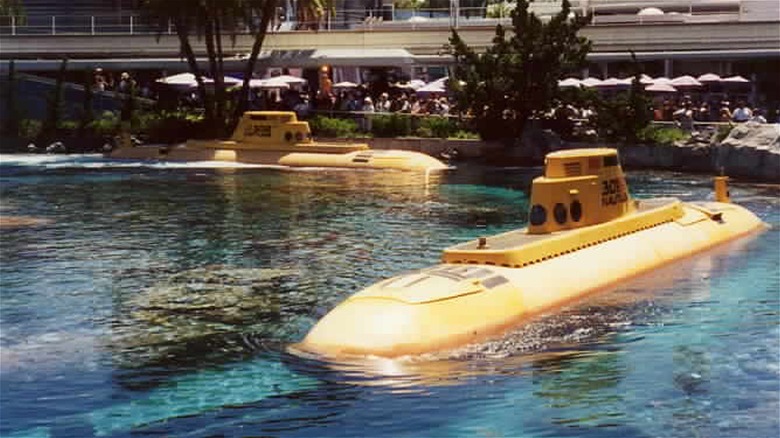
One of the rides to emerge from Disneyland’s first major expansion in 1959, the Submarine Voyage didn’t quite take guests 20,000 leagues under the sea — but it was still pretty cool. Featuring submarine-like vehicles attached to a track, the nearly 1,400-foot attraction would “dive” under the water, where guests would get to see Disney’s approximation of an oceanic voyage.
The subs would travel past sea caves, coral reefs, and various underwater creatures before cruising through a ship wreckage graveyard, through the North Pole, and then down to the depths of the sea. Here’s where things got really strange — think mermaids, a sea serpent, and even the lost city of Atlantis. Although beloved by many, the ride was shuttered in the late 1990s. Judging by the serious rust issues they’ve had since repurposing the subs to Finding Nemo, it’s likely the expense of maintenance was a deciding factor.
[Featured image by Elf via Wikimedia Commons | Cropped and scaled | CC BY-SA 4.0]
Rocket to the Moon became history…literally
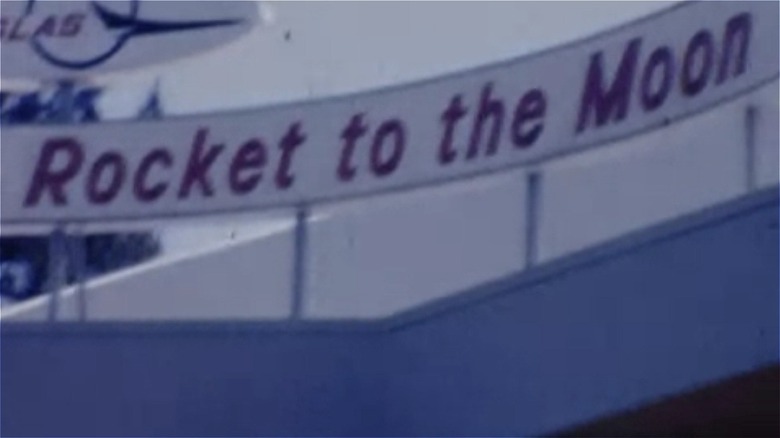
Back in 1955, when the idea of hopping on a rocketship still seemed to many like the very distant future, Disney’s Rocket to the Moon let guests imagine what it might be like to take that trip. While seated in a theater with a screen both above and below them, guests experienced a simulation of a rocket launch as they “climbed” closer to the moon. Around the time that the Apollo program started to take off, park execs knew it was time for a name change, although the replacement name (Flight to the Moon) doesn’t feel like much of a switch.
As gallivanting to the moon lost some of its novelty in the 1970s, Flight to the Moon got a makeover, rebranding as Mission to Mars before closing in 1992. That’s when Imagineers decided to shut it down to make room for the doomed nightmare-fuel ride ExtraTERRORestrial Alien Encounter.
The ExtraTerrorRestrial Alien Encounter was too scary
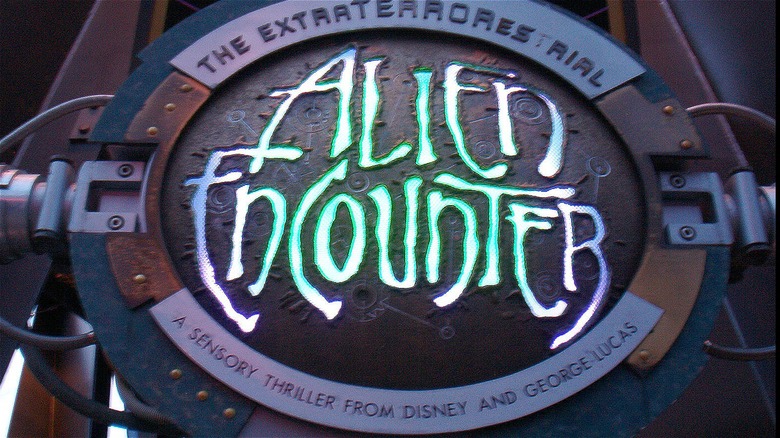
When folks think of Disney Parks, plenty of adjectives come to mind: magical, innovative, inspiring, for example. However, one word that most people wouldn’t normally associate with Disney Park rides is “terror,” which is why it seems more than a little surprising that Imagineers decided to create an attraction with the word smack dab in the middle of its name. But terror was indeed the point behind the frightening Lucasfilm-Disney co-production dubbed the ExtraTERRORestrial Alien Encounter.
Originally meant to take guests aboard the xenomorph-infested Nostromo from the movie “Aliens,” the idea of a ride inspired by the frightening R-rated film didn’t pass muster with senior Imagineers, forcing the team to pivot. Even so, the ride that eventually rolled out seemed to keep a lot of that space horror spirit, albeit decidedly watered down. As the ingenious rider swap that makes it easy to hand off small kids to another member of your party had not yet been invented, ride lines eventually began to lag. In 2003, the ride was replaced with the more family-friendly Stitch’s Great Escape. Not quite as terrifying, admittedly.
[Featured image by Steven Miller via Wikimedia Commons | Cropped and scaled | CC BY-SA 2.0]
Starlord killed Universe of Energy
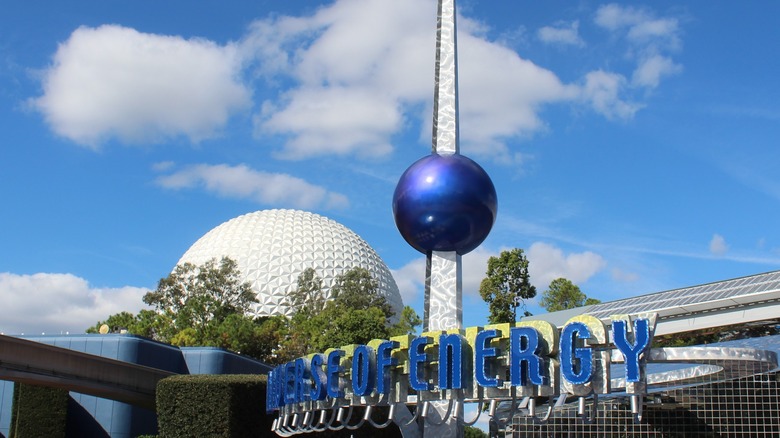
Picture this: The year is 1989, and the Florida heat is bearing down. The lines at every Epcot attraction have been a mile long, and you’re in dire need of a catnap in the cool air conditioning. Suddenly, you remember Universe of Energy, the nearly 40-minute slow-moving, large-scale dark ride and droning documentary rolled into one. Booyah! The afternoon is saved! Sponsored by ExxonMobil, this ASMR-adjacent dark ride began in a primeval world of audio-animatronic dinosaurs before positioning them in front of three large, curved screens in a sprawling, dark room.
Through inspiring imagery and music and, later, the comedic stylings of Ellen Degeneres and Bill Nye, guests were treated to a refresher on their middle school science class. Sadly for fans of the secret nap spot, the ride closed down in 2017 to make room for the enclosed roller coaster Guardians of the Galaxy: Cosmic Rewind.
[Featured image by Theme Park Tourist via Wikimedia Commons | Cropped and scaled | CC BY-SA 2.0 Generic]
The Rocket Rods were considered a disaster
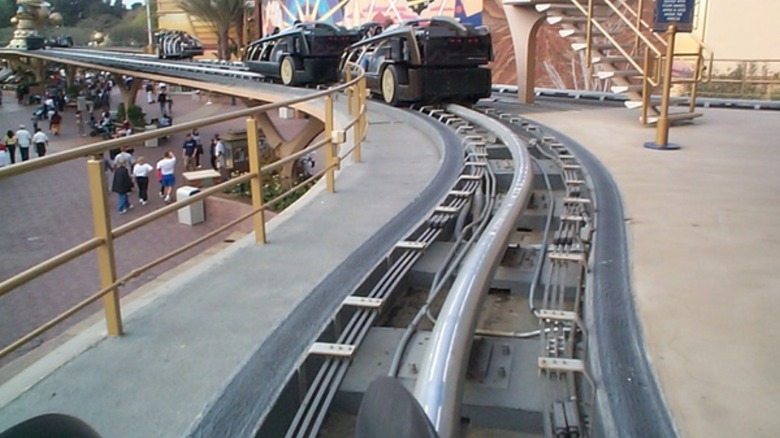
Dubbed “Disneyland California’s most disastrous attraction” by Weird Disney, the Rocket Rods kicked off in 1998 only to get shut down a measly two years later. A drag race-themed ride, the entire concept seemed doomed from the start after Imagineers decided it was a perfectly fine idea to repurpose the slow-going Peoplemover track infrastructure as a faster-running ride in an effort to save a few bucks.
What they didn’t account for was how jerky the resulting ride would be or that it couldn’t maintain its speed due to the tight turns of the track. Unsurprisingly, people hated it, and to add insult to injury, the rods were constantly breaking down. By 2001, the decision-makers at the park had had enough of the failed attempt and decided to shut it down for good.
[Featured image by Rabit via Wikimedia Commons | Cropped and scaled | CC BY-SA 3.0 Unported]
Superstar Limo was universally hated
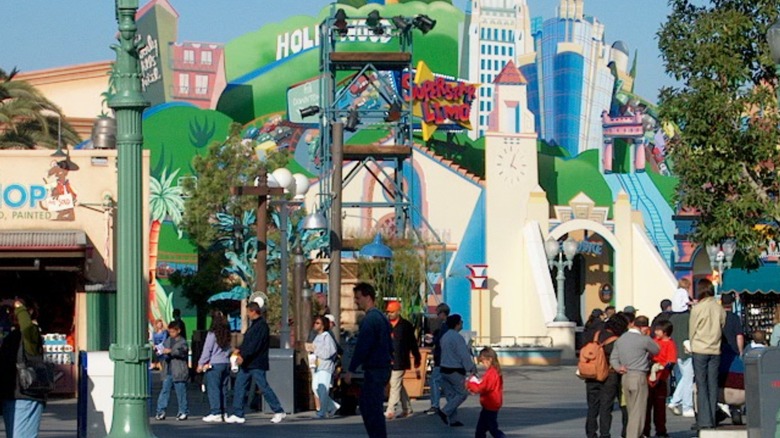
Easily a contender for Disney’s most-hated ride of all time, Superstar Limo was the short-lived, wacky Disney California Adventure ride that ran for just 11 months before getting the ax. So what made this ride such a groaner? A huge part of it was the ride’s premise — one that certainly hasn’t aged well by today’s standards, but in all fairness, it wasn’t a great idea in 2001.
The cheesy dark ride compelled guests to imagine they were Hollywood stars getting chased around Los Angeles at high speeds by the paparazzi. Although the ride had been in the planning phase before Princess Diana’s 1997 death, this didn’t dissuade Disney from completely scrapping the project. The ride would turn out to be almost universally hated by park guests, leading to its fairly speedy closure.
[Featured image by The Fun Chronicles via Wikimedia Commons | Cropped and scaled | CC Zero]
Snow White’s Scary Adventures became a princess hangout
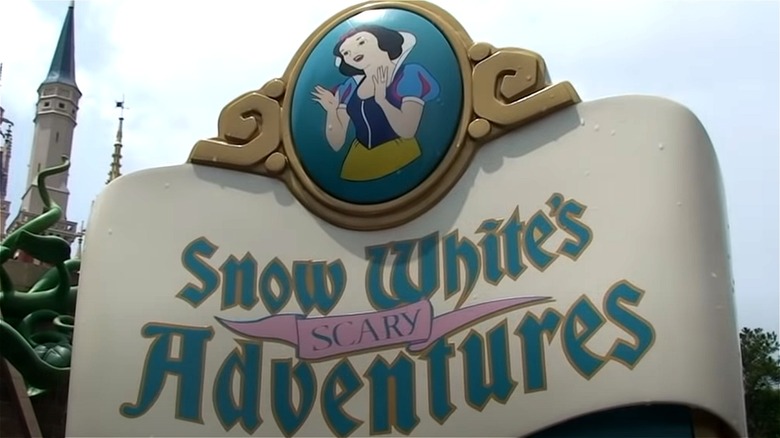
Much like Disney’s Haunted Mansion ride, Snow White’s Scary Adventures managed to capture that “little kid scary” energy that helped add to the magic of so many family vacations. The underrated Disney dark ride based on the 1937 film “Snow White and the Seven Dwarfs” carried park guests through the story, fully immersing them in the world of the O.G. Disney princess.
The ride proved popular and soon appeared in Disneyland, Walt Disney World, Disneyland Paris, and Tokyo Disneyland. However, the versions that still exist today have had their scary factor toned down quite a bit. The Snow White ride at Walt Disney World was pulled altogether to make room for Princess Fairytale Hall in 2012. Here, guests can make their smaller family members’ dreams come true by giving them a chance to meet and mingle with their favorite Disney princesses, who rotate in and out at scheduled times. The ride was reimagined at Disneyland sans nightmare fuel and now exists as Snow White’s Enchanted Wish.

